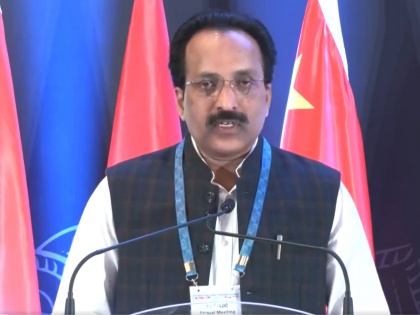India Aims to Achieve Debris-Free Space Missions by 2030: ISRO Chief Somanath
By Anubha Jain | Published: April 17, 2024 04:28 PM2024-04-17T16:28:32+5:302024-04-17T16:29:33+5:30
“To reduce space debris, ISRO with the Department of Science is implementing a zero debris space policy for government ...

India Aims to Achieve Debris-Free Space Missions by 2030: ISRO Chief Somanath
“To reduce space debris, ISRO with the Department of Science is implementing a zero debris space policy for government as well as private organizations in the space industry. India wants the policy to be adopted and accepted by other nations globally.” Stated by Chairman ISRO S.Somanath on Tuesday during the inaugural ceremony for the 42nd Inter-Agency Space Debris Co-ordination Committee (IADC) annual meet organized by ISRO in Bengaluru. About 20 countries, including, China, Australia, Canada, and Germany with other nations are participating in the event.
Somanath further said that compliance of mitigation of space debris must be robust in the coming days considering the large number of spacecraft being launched into Low Earth Orbit. These launches has caused excessive crowding of space system beyond what has been forewarned. He said that humans will travel to space in the future. Debris in space like a 1 mm size broken particle of a spacecraft or even a paint flake can kill a person. The policy seeks to achieve debris-free space missions by 2030 and will be implemented by 2025 after which every year the progress will be reviewed. Somanath said, “We can’t control or stop debris travelling with the high speed. India’s aim through this policy is to ensure that all spacecraft are disposed of after their lifetime and develop measures to prevent the destruction and explosion of space objects.
Somanath said that the three key principles for managing space debris are avoiding creating new debris by properly disposing of satellites after their function ends, preventing explosions by removing the propellants and other materials, and lastly, minimizing collisions through clear identification, warning systems, and designing hardware to prevent further degradation if hit by debris.According to IADC, there are a total of 37000 objects orbiting in space and of them 10000 are operational objects. By, 2030 the number of operational objects will surpass the debut objects which is expected to be about 60,000. ISRO has 54 spacecraft in the space orbit. Anil Kumar, Associate Director of IADC said, "The damage will be huge if the debris collides with one of our spacecraft. We have to constantly track this debris and check if it is coming close to our operational satellite as crores of rupees have been spent to launch these satellites. We want to do projects based on the zero debris policy.
"The Indian Space Research Organization (ISRO) has successfully tested and developed a lightweight carbon-carbon (C-C) nozzle for rocket engines, marking a breakthrough in rocket engine technology. This is accomplished by the Vikram Sarabhai Space Centre (VSSC). The innovation enhances the significant parameters of rocket engines including thrust levels, specific impulse, and thrust-to-weight ratios, thereby boosting the payload capacity of launch vehicles. The nozzle with low density, and high specific strength is capable of retaining mechanical properties yet at raised temperatures. The result of this development is vital for ISRO’s workhorse launcher, the Polar Satellite Launch Vehicle (PSLV), and increases the payload capability of PSLV by 15kg. In the fourth stage of PSLV, i.e., the PS4, when replacing the metallic nozzles with C-C counterparts a mass 67% reduction can be achieved.
Open in app